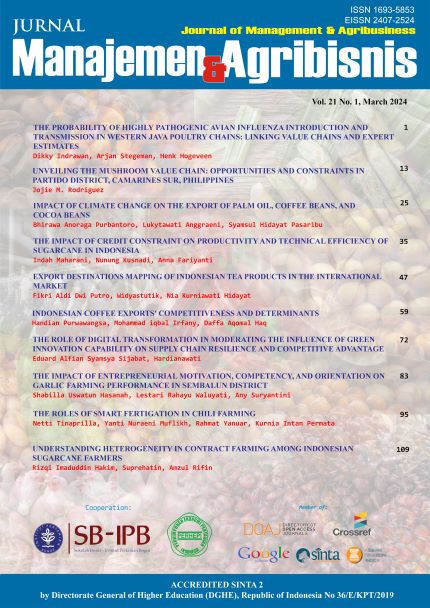The Role of Digital Transformation in Moderating The Influence of Green Innovation Capability on Supply Chain Resilience and Competitive Advantage
Abstract
Digital transformation and breakthrough innovations that contain concern for the environment can answer the target of reducing logistics costs and regulatory provisions which ultimately become a source of excellence for companies and maintain company’s supply chain resilience. The aim is to explore digital transformation role and the ability to innovate in generating supply chain resilience and competitive advantage for companies. This research was conducted on 168 stevedoring service companies in 5 major Indonesian ports that are members of the Association of stevedoring companies in Indonesia. Data was collected through the distribution of questionnaires via Google Forms, and subsequently analyzed using descriptive and inferential statistics. The study found that companies with strong green innovation capabilities had higher supply chain resilience and competitive advantage. Digital transformation for companies weakens the ability to innovate green in gaining supply chain resilience as long as the breakthrough innovation made is not related to technology adaptation. Different results show that digital transformation strengthens the ability to innovate green and generate competitive advantages for companies. The findings of this study provide further evidence to support the theory of competitive advantage based on the resource-based view (RBV).
Keywords: stevedoring, digital transformation, green innovation, supply chain resilience, competitive advantage
Authors
Authors who publish with this journal agree to the following terms:
- Authors retain copyright and grant the journal right of first publication with the work simultaneously licensed under a Creative Commons Attribution License that allows others to share the work with an acknowledgement of the work's authorship and initial publication in this journal.
- Authors are able to enter into separate, additional contractual arrangements for the non-exclusive distribution of the journal's published version of the work (e.g., post it to an institutional repository or publish it in a book), with an acknowledgement of its initial publication in this journal.
- Authors are permitted and encouraged to post their work online (e.g., in institutional repositories or on their website) prior to and during the submission process, as it can lead to productive exchanges, as well as earlier and greater citation of published work (See The Effect of Open Access).

